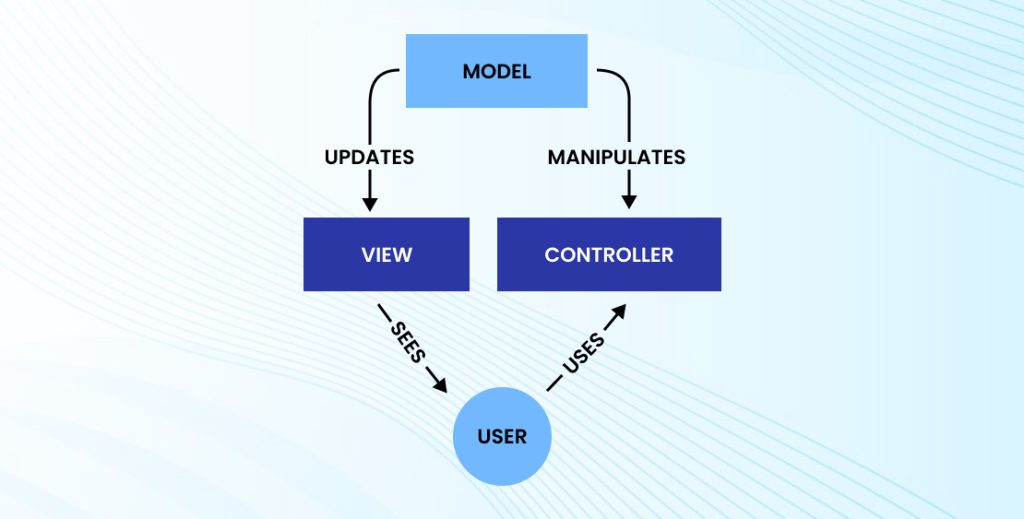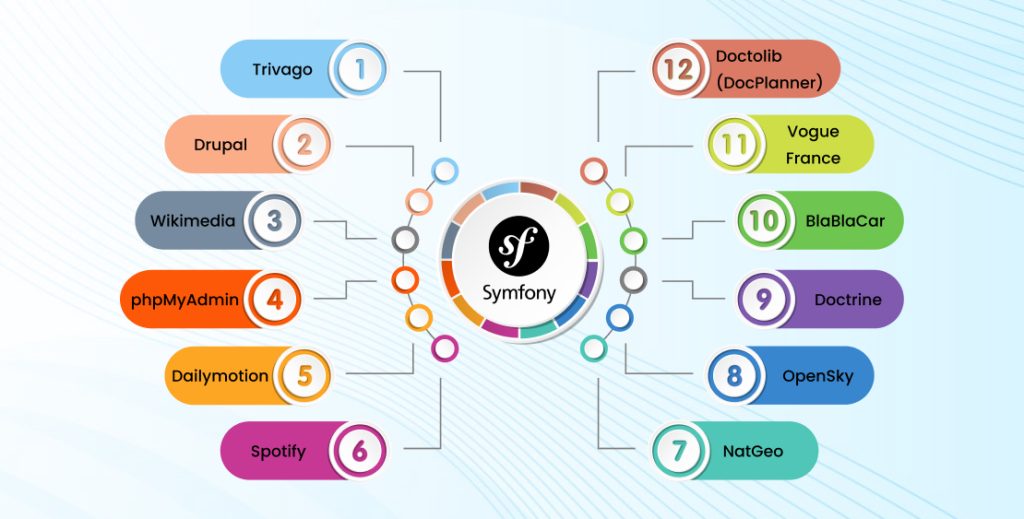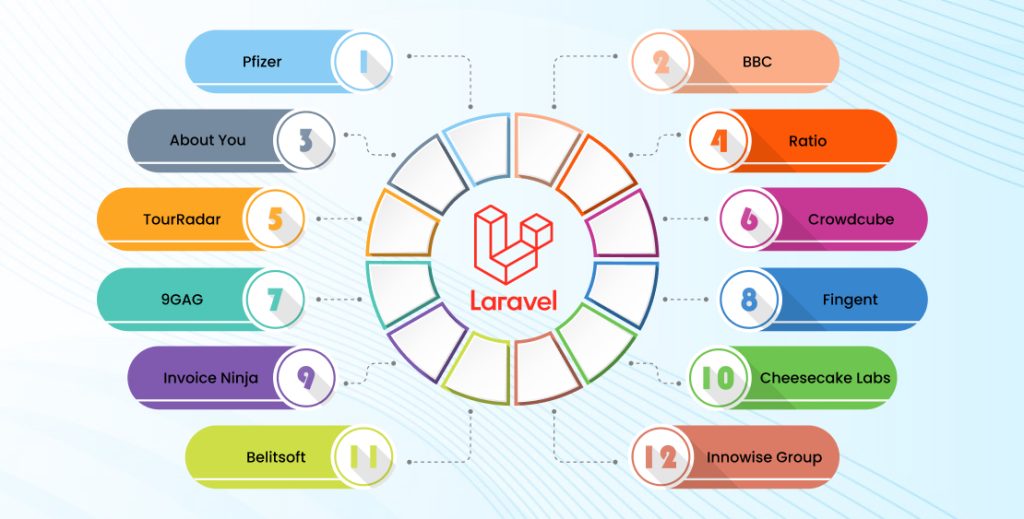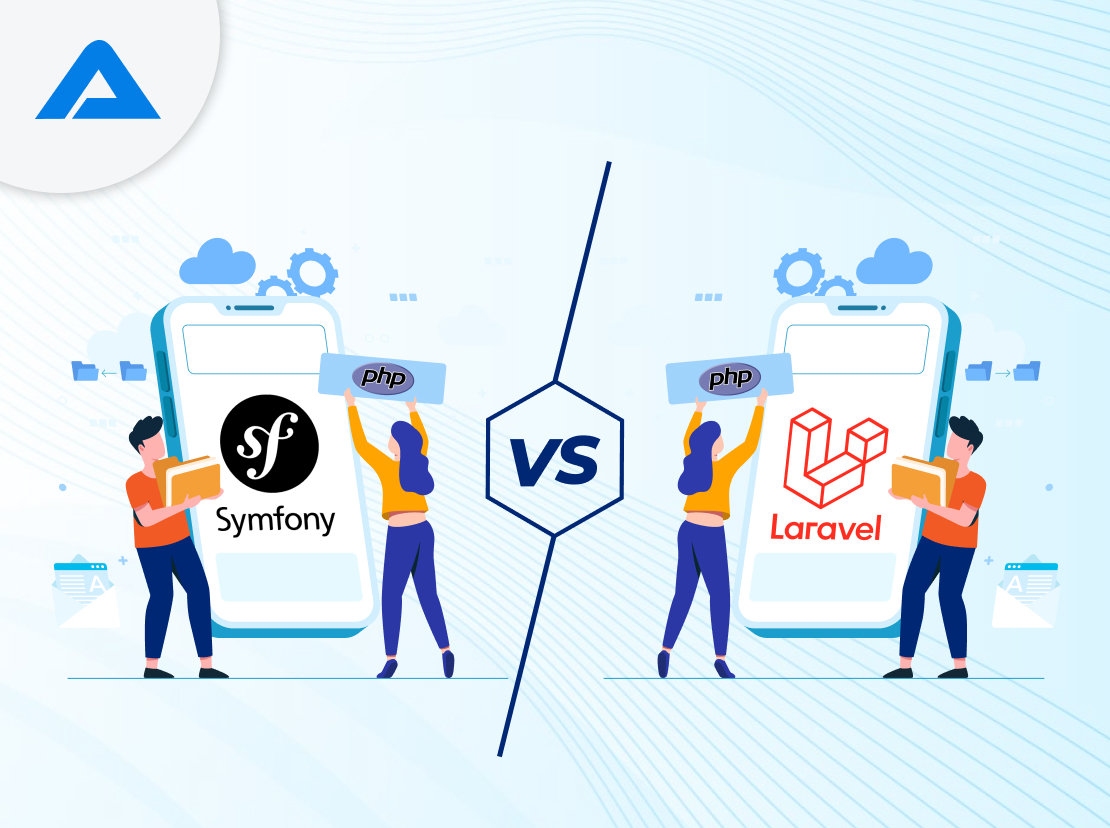PHP’s frameworks are essential for web developers that provide a structured foundation and tools for building dynamic and robust web applications. They offer pre-built components, libraries, and conventions that enhance development, encourage best practices, and ensure maintainability.
Let’s explore why you pick the right PHP framework for your Web Application Development essentials. Imagine crafting a masterpiece; you wouldn’t grab a paintbrush for woodworking, right? Similarly, choosing the right framework is like selecting the best toolkit for your project. Here’s why it matters:
- Efficiency: Think of frameworks as shortcuts for developers. They come with pre-made components and functions, saving you time and effort. This efficiency means your project gets completed faster.
- Scalability: Your web app could start small and then boom! It’s a hit, and thousands of users flock to it. The right framework ensures your app can grow seamlessly without falling apart.
- Security: Security is like a superhero’s shield in the web world. Reputable frameworks are designed with security features that safeguard your app from digital villains.
- Community and Support: Imagine having a team of fellow architects ready to help you whenever you’re stuck. Frameworks with active communities offer just that—resources, advice, and a helping hand.
- Maintainability: Ever built something that turned into a mess later? Frameworks impose a certain order and structure, making your code easy to maintain even as your app evolves.
- Future-Proofing: Just like fashion trends change, so does the technology landscape. Choosing a widely-used and regularly updated framework means your app stays relevant in the ever-changing digital world.
What is Symfony?
Symfony isn’t just a framework; it’s your ally in web development. Think of it as a treasure chest with tools tailored to craft extraordinary digital experiences. It provides flexibility that matches your creative vision, from building sleek corporate websites to quirky blogs.
But it’s not just about tools; it’s about community. Symfony’s vibrant community is your support network, guiding you through challenges and sharing insights. With years of refinement, it brings reliability and stability to your projects like a trusted friend.
Its modular approach empowers you to select the perfect components for your needs, whether user authentication or seamless database management. It invites you to shape digital worlds, transforming ideas into interactive reality. So, if web development is your journey, consider Symfony your seasoned guide, ready to turn your visions into awe-inspiring web applications.
Key Features of Symfony
When it comes to powering web app development, Symfony stands as a versatile toolkit, offering a range of features tailored to streamline the creation process. Let’s take a closer look at what makes it a top choice for a web app development company:
1. MVC Design Pattern:

Symfony accepts the Model-View-Controller (MVC) design pattern, neatly organizing your code into separate layers for efficient development and easier maintenance. This separation of concerns enables your team to collaborate seamlessly, enhancing code reusability.
2. Flexible URI Routing:
Routing is a breeze with Symfony’s flexible URI routing system. This feature lets you map URLs to specific controllers and actions, ensuring clean and user-friendly URLs while maintaining the underlying logic.
3. Twig Template Engine:
It incorporates the Twig template engine, simplifying the creation of dynamic and visually appealing templates. Twig’s clean syntax promotes separation between code and presentation, resulting in more readable and maintainable templates.
4. Session Management:
It simplifies session management, a vital component for maintaining user state across different pages. This feature ensures smooth user experiences by efficiently handling user authentication and maintaining session data.
5. Error Logging:
In web app development, identifying and addressing errors is crucial. Symfony’s error logging capabilities allow you to track and troubleshoot issues efficiently, ensuring a smooth user experience and minimizing downtime.
For a web app development company, Symfony’s array of features offers a robust foundation to create exceptional applications. From well-structured code to user-friendly URLs and efficient session management, Symfony empowers development teams to craft web applications that are both powerful and user-centric.

Want you to Build a Secured Web Solution for Your Business? Talk to us. Our experienced web developers are well-versed in building scalable web solutions using innovative tools and technologies.

Pooja Upadhyay
Director Of People Operations & Client Relations
Use Cases of Symphony Framework

Regarding web development, it has proven its prowess by empowering some of the biggest names across industries. Let’s take a tour of the digital landscape and explore how Symfony plays a pivotal role in shaping these renowned platforms:
1. Trivago: The travel giant Trivago relies on Symfony to ensure seamless browsing experiences for travelers worldwide. Symfony’s flexibility and robust architecture align perfectly with the complexities of a travel search engine.
2. Drupal: As a well-known content management system (CMS), Drupal utilizes Symfony components to enhance its functionality. Symfony’s powerful tools contribute to Drupal’s ability to effectively manage, organize, and present content.
3. Wikimedia: The backbone of Wikipedia and its sister projects, Wikimedia trusts Symfony to manage the vast amount of data and content on its platforms. Symfony’s scalability and modularity are key to handling the traffic of a globally-used resource.
4. phpMyAdmin: For managing MySQL databases, phpMyAdmin utilizes its components to provide an intuitive and efficient user interface. Symfony’s underlying structure helps maintain the quality and security of the database management system.
5. Dailymotion: The video-sharing platform Dailymotion relies on it to deliver video content to millions of users daily. Symfony’s ability to handle high traffic loads while maintaining stability is crucial for platforms like Dailymotion.
6. Spotify: As one of the world’s most popular music streaming services, Spotify leverages Symfony for its backend infrastructure. Symfony’s versatility supports the delivery of music to millions of listeners globally.
7. National Geographic (NatGeo): Even educational giants like NatGeo benefit from Symfony’s capabilities. The platform uses it to create engaging digital experiences that educate and inspire people worldwide.
8. OpenSky: OpenSky, an e-commerce platform, relies on Symfony’s flexibility to provide a seamless shopping experience for its users. Symfony’s ability to handle complex functionalities ensures a smooth customer journey.
9. Doctrine: Doctrine, a widely-used object-relational mapping (ORM) tool for PHP, is built on top of its components. Symfony’s reliable foundation ensures efficient database interactions and data management.
10. BlaBlaCar: The carpooling platform BlaBlaCar utilizes it to connect travelers heading in the same direction. Symfony’s robustness ensures that users can trust the platform for safe and convenient ridesharing.
11. Vogue France: Even in fashion and lifestyle, it makes its mark. Vogue France relies on Symfony to deliver fashion enthusiasts a stylish and user-friendly online experience.
12. Doctolib (DocPlanner): The healthcare scheduling platform Doctolib, or DocPlanner, leverages it to manage appointments and healthcare services efficiently. Symfony’s reliability supports the critical nature of medical scheduling.
Symfony’s diverse applications across these renowned platforms showcase its adaptability and power in web development. From healthcare travel, it repeatedly proves that it’s a force to be reckoned with in creating exceptional digital experiences.
What Is Laravel?
Laravel is the cornerstone of modern web development, driving excellence in creating captivating digital experiences. It’s a PHP framework that simplifies the intricate world of coding, offering tools for tasks like routing, authentication, and database management. Laravel isn’t just about building code; it’s about crafting remarkable web applications that engage users. With elegant syntax and robust features, it transforms complexity into simplicity. It’s not just a framework; it’s a promise of innovation, enabling future-ready applications through modern practices like MVC architecture and RESTful routing. It’s the essence of creating captivating online wonders.
Key Features of Laravel
Laravel is a powerhouse of tools that elevates your Laravel development services to new heights. Here are some standout features that make it a must-have in the world of web development:
1. MVC Design Pattern:
Its strong adherence to the Model-View-Controller (MVC) design pattern ensures a structured and organized codebase. This separation enhances collaboration among developers, making your development services efficient and maintainable.
2. Inbuilt Authentication:
Security is paramount in web applications. it simplifies user authentication with built-in features, making it a breeze to implement secure user access and management.
3. Blade Template Engine:
Crafting elegant and dynamic web pages is seamless with its Blade template engine. Its intuitive syntax streamlines HTML rendering, making your web development services effortlessly create stunning interfaces.
4. Artisan Built-In Command Line Tool:
Artisan tools are like a magic wand for developers. It automates mundane tasks, speeds up development, and ensures consistency, enhancing the efficiency of your Laravel development services.
5. Unique Support for Unit Testing:
Quality assurance is integral. Its unique support for unit testing facilitates the creation of robust and error-free applications, assuring the reliability of your development.
Its comprehensive features transform ideas into polished, secure, and efficient applications. From organized code to seamless authentication and testing, it enhances your development services, delivering excellence to clients and users.
Use Cases Of Laravel

The versatility of Laravel shines through in its impressive list of use cases, catering to diverse industries and powering prominent brands. Let’s explore how its capabilities have driven success for various organizations:
1. Pfizer: Even in the healthcare sector, it finds its place. Pfizer, a leading pharmaceutical company, leveraged Laravel to build secure and efficient web applications that support their research and healthcare initiatives.
2. BBC: The renowned British Broadcasting Corporation (BBC) relies on Laravel to deliver engaging digital content to millions of users. Its robustness ensures smooth user experiences on the BBC’s various online platforms.
3. About You: The fashion and lifestyle sector also benefits from Laravel’s prowess. About You, a popular online fashion retailer harnesses it to create an interactive and user-centric shopping experience.
4. Ratio: A digital agency, Ratio uses Laravel to develop dynamic and visually appealing websites for its clients. Its features enable Ratio to deliver top-notch web solutions.
5. TourRadar: In the travel industry, Laravel takes center stage. TourRadar, a global travel marketplace, uses it to build a platform that connects travelers with tour operators seamlessly.
6. Crowdcube: Crowdcube, a crowdfunding platform, relies on Laravel to facilitate secure and user-friendly crowdfunding campaigns. Its capabilities help manage complex transactions and user interactions.
7. 9GAG: Entertainment platform 9GAG embraces Laravel’s flexibility to offer a delightful user experience. Its tools contribute to the platform’s dynamic content delivery and user engagement.
8. Fingent: Fingent, a software development company, employs Laravel to create customized software solutions for clients. Its versatility helps Fingent deliver tailor-made applications.
9. Invoice Ninja: Its capabilities extend to financial applications like Invoice Ninja, an invoicing and billing platform. its robust features ensure accuracy and security in financial transactions.
10. Cheesecake Labs: Cheesecake Labs, a mobile app development company, uses Laravel to create app backends. Its efficient tools streamline backend development, enhancing overall app performance.
11. Belitsoft: Belitsoft, a software development company, leverages it for various projects. Its features contribute to building robust and scalable software solutions.
12. Innowise Group: Innowise Group, an IT consulting and development company, employs Laravel to develop custom web applications for clients. Its flexibility suits Innowise Group’s diverse projects.
Its widespread use in these diverse industries underscores its adaptability and reliability. The answer for businesses looking to achieve remarkable digital feats is clear: hire Laravel developers and tap into a framework that empowers success.
Symfony vs Laravel: Pros & Cons
When choosing a PHP framework for your web application, Laravel and Symfony are two popular options. Both frameworks offer unique features and advantages, but they also come with their trade-offs. Understanding the pros and cons of Laravel and Symfony can help you make an informed decision based on your project’s requirements and goals. Here’s a friendly guide to help you compare Laravel and Symfony.
Symfony: Pros & Cons
Pros:
Flexibility: Symfony is known for its flexibility and modular architecture. It allows developers to pick and choose components based on their project’s requirements, making it suitable for complex and highly customized applications.
High Performance: Symfony is designed with performance in mind and is often preferred for large-scale and enterprise-level applications. Its optimized code and architecture contribute to better performance and scalability.
Reusability: Symfony components are reusable across different projects, which can reduce development time and effort. The framework’s adherence to best practices and design patterns ensures high-quality code.
Customization: Symfony offers extensive customization options, allowing developers to tailor the framework to meet specific needs. Its flexibility makes it a good choice for projects with unique requirements.
Strong Documentation: Symfony provides comprehensive and detailed documentation, which is valuable for developers working on complex projects. The documentation helps developers understand and utilize Symfony’s features effectively.
Cons:
- Steeper Learning Curve: Symfony’s flexibility and extensive features can result in a steeper learning curve compared to Laravel. Developers may need more time to become proficient with Symfony, especially if they are new to the framework.
- Slower Development: Due to its complexity and modular nature, Symfony may require more time to set up and develop than Laravel. The additional configuration and customization can extend development timelines.
- More Configuration: Symfony’s emphasis on flexibility means that it often requires more configuration and setup compared to Laravel. This can be a disadvantage for projects that need a quick turnaround.
Laravel: Pros & Cons
Pros:
Ease of Use: Laravel is known for its user-friendly syntax and straightforward approach, making it ideal for beginners and developers who want to get started quickly. The framework’s intuitive features and clear documentation help streamline the development process.
Rapid Development: Laravel provides built-in tools for common tasks such as routing, authentication, and database management. These features accelerate development and reduce the need for repetitive coding.
Elegant Templating: Laravel’s Blade templating engine allows for clean and readable code, making it easier to design and manage views. Blade’s syntax is simple yet powerful, enhancing the development experience.
Robust Ecosystem: Laravel boasts a vibrant ecosystem with tools like Laravel Forge and Laravel Envoyer for deployment and Laravel Nova for administration. This ecosystem supports a wide range of development needs and simplifies project management.
Active Community: Laravel has a large, active community of developers contributing to its growth. This community offers valuable resources, tutorials, and packages that can extend Laravel’s functionality.
Cons:
Performance: While Laravel is optimized for ease of use, it may not be as performant as Symfony in certain high-traffic or resource-intensive applications. Developers may need to implement additional optimization strategies for performance-critical projects.
Less Flexibility: Laravel’s opinionated design and built-in tools can sometimes limit flexibility. If you need a highly customized solution, Symfony’s more modular approach is better suited to your needs.
Learning Curve: Although Laravel is generally considered beginner-friendly, its extensive features and conventions can pose a learning curve for developers new to PHP frameworks.

5 Key Factors to Consider When Choosing Between Symfony and Laravel
Selecting the right PHP framework is crucial for your project’s success. When deciding between Symfony and Laravel, consider the following factors to make an informed choice:
1. Project Requirements
Your business type, major needs, target audience, and specific goals will guide your framework choice. Understanding these requirements helps clarify the development process and determines which framework aligns with your project’s needs. Laravel is known for its ease of use and quick setup, while Symfony offers greater flexibility for complex requirements.
2. Project Size
The size of your project influences the framework selection. Laravel is well-suited for small to medium-sized projects due to its rapid development capabilities. In contrast, Symfony excels in handling larger, high-investment projects thanks to its robust and scalable architecture.
3. Business Goals
Consider your business objectives when choosing a framework. Laravel is ideal for achieving fast results and meeting short-term goals. On the other hand, Symfony is better for long-term projects and websites aiming to capture a broad audience, thanks to its extensive features and customization options.
4. Developers’ Skillset
The skill level of your development team is an important factor. Laravel is designed to be beginner-friendly and straightforward, requiring less advanced programming skills. Symfony, however, has a steeper learning curve and is suited for developers comfortable with complex object-oriented programming and advanced technical aspects.
5. Timeframe
Your project’s timeline can influence your framework choice. If you need a quick turnaround and faster deployment, Laravel is the preferred option due to its streamlined development process. With its detailed configuration and setup, Symfony might take longer, but it is ideal for projects requiring in-depth customization.
Evaluating these factors will help you choose the right framework for your project. If you’re still unsure, analyzing these aspects in detail will guide you toward the best decision for your needs.
Symfony vs Laravel: A Comprehensive Battle
The battle between Symfony and Laravel is nothing short of epic. Let’s dive into their strengths and draw comparisons in key areas:
- Similarities: Both belong to the PHP family, offering tools that accelerate web application development. They share the common goal of simplifying complex tasks and encouraging best coding practices.
- Popularity: Both frameworks enjoy widespread popularity in web application circles. They’ve amassed strong communities, providing abundant resources, plugins, and documentation.
- Learning Curve: It is known for its user-friendly syntax, often presents a smoother learning curve for developers than Symfony, making it a preferred choice, particularly for newcomers.
- Performance: Symfony and Laravel boast efficient performance, but Symfony often edges ahead in handling larger and more complex applications. For speed and scalability, it can be an apt choice.
- Modularity and Scalability: Symfony’s modularity shines, allowing developers to cherry-pick components for specific needs. However, its elegance in modular design makes it easier to scale and customize applications rapidly.
- Security: Both frameworks prioritize security, providing tools and practices to safeguard web app projects. Symfony’s established security components contribute to a robust defense against threats.
- ORM (Object-Relational Mapping): Symfony’s Doctrine and Laravel’s Eloquent are powerful ORM tools that streamline database interactions. While Doctrine emphasizes configuration and control, Eloquent boasts expressive syntax and quick setup.
- Database Migration: Both facilitate smooth database migration. Fueled by Artisan, its migration system simplifies version control and collaborative database changes.
- Support and Community: Both communities are active and supportive. Symfony’s extensive community offers enterprise-level solutions, while its friendly environment caters to a broader range of developers.
As the curtains rise in the world of Laravel web application development, choosing between both of them depends on the unique needs of your project. While both bring remarkable features, the decision ultimately boils down to your familiarity, project scope, and development team’s strengths.
Symfony vs Laravel: Which Should You Choose?
The Symfony vs. Laravel debate is a crucial crossroads in the ever-evolving web development landscape. Choosing between the two hinges on your project’s needs. Let’s shed light on this dilemma:
Symfony: The Power Player
Symfony’s modular architecture shines if you’re aiming for a complex, enterprise-grade project. It offers meticulous customization and scalability, making it a choice for projects with a longer development cycle. Symfony’s robust security measures and established community cater well to high-stakes endeavors.
Laravel: The Versatile Performer
For those seeking elegance and speed, Laravel takes the lead. Its beginner-friendly syntax and intuitive tools make it ideal for rapid development. It suits projects of various sizes and complexities, focusing on user experience.
The Symfony vs Laravel decision isn’t a one-size-fits-all equation. It’s about aligning your project’s DNA with the strengths of each framework. Consider your timeline, your team’s proficiency, and project goals. Whether you’re crafting intricate systems or bringing swift innovations to life, the choice boils down to what speaks to your project’s unique narrative.
Conclusion
As the curtains draw on the Symfony vs. Laravel debate, remember that your choice resonates with the essence of your Laravel development company. Symfony’s potency lies in complexity, catering to enterprises seeking robust solutions. Its allure rests in its elegance and agility, suited for diverse projects.
Choosing between both frameworks; it’s about the identity of your Laravel development company. Consider your team’s strengths, project specifics, and long-term goals. Whether you’re embarking on monumental ventures or refining existing ones, the final decision shapes your journey in web development.
Embrace the unique strengths of both frameworks and let them be the guiding stars that illuminate your company’s path toward crafting remarkable digital experiences.
FAQ about Laravel vs Symfony
Laravel is generally easier for beginners. Its clear documentation, simple setup process, and user-friendly syntax make it a great choice for those new to PHP frameworks. Laravel’s built-in features and conventions simplify the development process, allowing beginners to get up and running quickly.
Symfony, while powerful, has a steeper learning curve. It is more complex and requires a deeper understanding of PHP and web development concepts. Its extensive configuration options and robust features can overwhelm those just starting.
Performance can vary based on specific use cases and application needs. Symfony is known for its high performance and scalability, particularly in large and complex projects. It offers fine-grained control over performance optimization.
Laravel also performs well but is often chosen for its ease of use rather than raw performance. For most standard applications, Laravel provides sufficient performance. However, for highly demanding or performance-critical applications, Symfony’s detailed optimization capabilities might be more suitable.
Yes, Laravel can handle large-scale enterprise applications. It is designed to be scalable and can support complex projects with the right architecture and optimization. Laravel’s modular structure, support for caching, and integration with various databases and tools make it a viable choice for large applications. However, Symfony’s extensive features might offer additional advantages for complex and highly customized needs.
Laravel provides a range of built-in features aimed at simplifying development, including:
- Eloquent ORM for database interactions
- Blade templating engine
- Artisan CLI for command-line tasks
- Built-in authentication and authorization
Symfony, on the other hand, is known for its flexibility and extensive built-in components, such as:
- Twig templating engine
- Doctrine ORM for database management
- Symfony Console for command-line tasks
- Comprehensive security and caching mechanisms
Symfony’s components are more modular, allowing for greater customization and flexibility in large applications.
Symfony is typically better for high customization and flexibility. Its modular architecture and extensive configuration options allow developers to tailor the framework to fit specific needs and preferences. Symfony’s components can be used independently, providing greater control over various aspects of development.
Laravel, while flexible, follows more conventions and provides a more opinionated structure. This can simplify development but may limit customization compared to Symfony.
Apart from Laravel and Symfony, several other PHP frameworks are popular among developers:
- CodeIgniter: Known for its simplicity and small footprint, ideal for rapid development.
- Yii: Offers high performance and is suitable for building large-scale applications.
- CakePHP: Provides a rapid development framework with a convention-over-configuration approach.
- Zend Framework: A robust framework focusing on enterprise-level applications and extensibility.
Each framework has strengths and is suited to different projects and development needs.

Are you looking to Hire a Dedicated Laravel Developer? Our skilled laravel developers provide tailored solutions that match your project’s unique needs.

Pooja Upadhyay
Director Of People Operations & Client Relations

